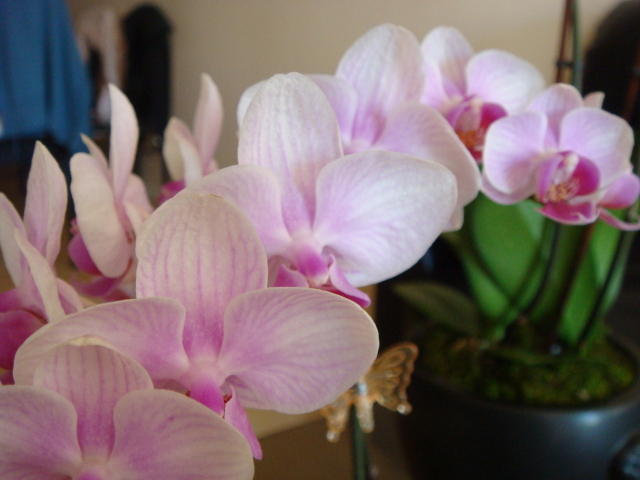QuestionQUESTION: I heard that neem oil serves as an organic and safe pesticide for all plants. Is this true and have you experienced using this natural method? If so, how would you use it?
ANSWER: Sanny, some growers support it's use. I have tried it and no longer use it because I have not been satisfied with the results. It, like any oil based insecticide, works by clogging the breathing orifices of insects. It is a contact insecticide so must be sprayed or rubbed onto the plant. It certainly is one of the safest insecticides and, if used, would be best used in a preventative fashion. I have not found it as effective as a systemic insecticide when there is a substantial infestation with mealy or scale insects.
---------- FOLLOW-UP ----------
 mini phal flowers
mini phal flowers
QUESTION: Thank you for answering all my questions, Wayne. It's much appreciated and I am very glad I found this website.
My mini phalaenopsis definitely has pests in the potting medium. I pulled the green support stick out today to check if the plant needs watering. I found two tiny black and round insects and one tiny silvery-looking insect with what I think were wings. Please recommend an insecticide as I am completely new to this. Could this be why my petals look a bit veiny (not as plump as before)?
ANSWER: The presence of these insects which primarily feed on the detritus of a broken down potting mix, suggests that you need to repot as soon as the plant goes out of flower. Use a clean pot and fresh orchid potting mix. You also should thoroughly rinse off the roots before repotting. Those insects do not attack the plant, but their presence suggests that the potting mix has decayed excessively and could produce root rot as it tend to retain moisture. When you repot, be sure to check the roots for any that have collapsed. These are the result of root rot and should be removed before repotting the plant.
The flowers appear normal in color and form as is the veining in the flowers.
---------- FOLLOW-UP ----------
QUESTION: Hi Wayne. Going back to the veiny-looking petals... Two of the newer flowering buds have now shrivelled up. What could be wrong?
AnswerIt is likely that the plant is at the end of its flowering period and no longer producing the hormones necessary for flowering. However, if you haven't repotted it, you might try doing so. In the process, if you see any collapsed orchid roots, that might be contributing to bud loss. Any root disturbance during the flowering cycle can contribute to flower or bud loss. The repotting is necessary to reestablish and/or maintain the long term health of your plant.






